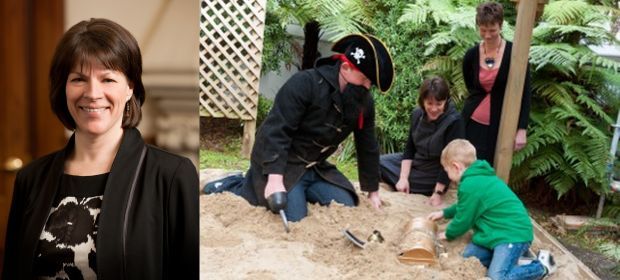
From left to right: Harlene Hayne, and a treasure hunt in the sandbox
While our early childhood experiences have a formative impact on our development, very few people have memories of events earlier than the age of three or four. This inability to recall experiences from our infancy and early childhood is known as childhood amnesia.
Harlene Hayne from the University of Otago has been trying to understand the mechanisms responsible for this phenomenon by studying memory development during infancy and early childhood. To do so, she has used a number of unique nonverbal techniques because the infants and children being studied are often unable to speak or explain in words what they remember. Some of the tasks that Harlene and her team have developed involve a large train track, a treasure hunt in a sandbox and the incredible shrinking machine (pictured below).
 What she has found is that while the hardware and software are in place for infants to store and retrieve memories, these memories are highly specific, so it may be difficult if not impossible for early memories to be retrieved by cues that were not part of the original experience. Which means that our early memories probably go unretrieved and unexpressed and are eventually lost. While Harlene is still an active researcher and has received a number of Marsden grants, she is also the Vice-Chancellor of the University of Otago, and Ruth Beran speaks with her in her office in the Clocktower building.
What she has found is that while the hardware and software are in place for infants to store and retrieve memories, these memories are highly specific, so it may be difficult if not impossible for early memories to be retrieved by cues that were not part of the original experience. Which means that our early memories probably go unretrieved and unexpressed and are eventually lost. While Harlene is still an active researcher and has received a number of Marsden grants, she is also the Vice-Chancellor of the University of Otago, and Ruth Beran speaks with her in her office in the Clocktower building.
Harlene will present two lectures at 12.30pm and 6pm on Thursday 1 May in Wellington as part of the Royal Society of New Zealand’s 10x10 series to mark the 20th anniversary of the Marsden Fund.

